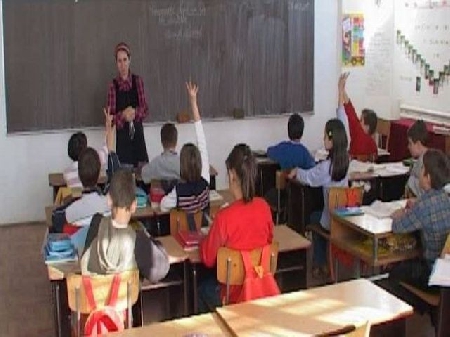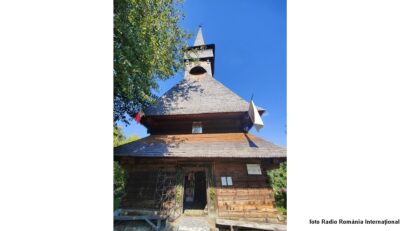Dropping Out of School
Children drop out of school before finishing their obligatory school cycle for a wide range of reasons.

România Internațional, 08.05.2013, 12:05
Children drop out of school before finishing their obligatory school cycle for a wide range of reasons. In many cases, the reason is poverty, or living in a social environment that places little value on formal education. A lot of times, the cost of books and notebooks, as well as extra-curricular activities, places too high a burden on some parents, who sometimes are less than encouraging regarding their children’s education. According to the Eurostat, on an overall average in all member states, 12.8% of kids in the EU drop out of school, down from 13.5% in 2011. The same source informs that Romania had an 18% dropout rate in 2010, going down to 17% in 2012. Unfortunately, this data is not very relevant when it comes to shedding light on the whole phenomenon in Romania, because it applies different definitions for dropping out and how to measure it. For instance, the definition used by the EU is: “The dropout rate is defined as the percentage of people between 18 and 24 years old who have secondary studies at the most and who are no longer registered in the education or vocational system.” Bogdan Goroceanu, an education expert with the World Vision organization in Romania, explains:
“Education practice in Romania defines dropping out as leaving school early. In Romania, dropping out means leaving school in the years of obligatory education. Figures in Romania on dropping out are much worse than in the rest of the EU. In terms of dropping out during obligatory education years, the figures differ greatly depending on who makes the measurements. UNICEF and the Institute for Education Sciences use the cohort system, measuring the number of children going into the school system one year and the percentage that manages to graduate the eight obligatory years. The Ministry of Education, on the other hand, measures drop out rates annually. They measure the number of children going in at the beginning of the school year, and at the end of the year they count the ones managing to finish. The balance is reported as drop out figures. For a child to be considered a dropout, they have to be out of school for three years in a row. We have a critical mass of children that we cannot call one way or another. The situation is quite uncertain, because we have not yet defined the concept of ‘in danger of dropping out’ or ‘dropping out risk’.”
However, no matter what method one uses to measure the phenomenon, Bogdan Georoceanu from World Vision told us about the figures in Romania:
“According to the Report on the State of Education, the Ministry of Education tells us that the overall drop out rate in Romania is 1.5% per year. In the countryside, the rate goes up to 1.7 or 2%, depending on gender and school cycle. When we talk about 9th and 10th grade, things are much worse. The entire rural environment faces this problem. We can rather say that there are peaks of attendance. I am talking about places that are better off, have infrastructure and school transportation, as well as qualified teachers. However, in poor and isolated communities, the situation is deplorable.”
In these poor and isolated communities, many of them villages, but also urban periphery, children drop out in larger numbers. Many schools are closed, access to those that are left is difficult, and sometimes children walk for miles to get to the nearest school. Also, many children are held back at home by their parents to help around the household, others are abandoned by parents going to work abroad, and generally they drop out of school for lack of encouragement. In order to help these kids, the World Vision organization has been running for a few years the ‘I Want to Go to 9th Grade’ program. So far, they helped 277 children from the countryside to continue their high school studies with help from sponsors willing to pay them a monthly scholarship. Among the beneficiaries is Ema, a senior in a rural high school in Ialomita county. Ema lives in a disadvantaged area on the edge of a town with two brothers and her parents, who have been unemployed for a long time. Ema told us how she enrolled:
“I got in touch with World Vision through social workers who told a few of us with higher grade averages that we could get a scholarship. Because I needed this scholarship, it was offered to me in 10th grade, it’s been almost three years now. The scholarship is 100 lei a month, which allows me to get school stuff, even clothes when I need to, and food as well. It is not much, but I am happy I’m getting it, because I get it for being good in school.”
In spite of her precarious material situation, Ema said she was never in danger of dropping out, which she loves. She would have managed even without that scholarship:
“I would have good results anyway, under any conditions. Due to this scholarship, I have much better study conditions, and I can afford books. I am sure, though, that I would get good grades even without it.”
Her sponsors, just like the sponsors for most other children, prefer to keep out of the public eye. However, Ema knows who they are.
“Not directly, only through letters. It’s a beautiful gesture on their part. They don’t help only by this monthly scholarship, they also send us gifts for holidays. We don’t ask them for anything, they do it at their own initiative. The sponsor gave us even a computer to help me study. That widened my horizon. What can I say about other problems? There have been a few school trips I couldn’t go on…”
It is obviously difficult for a child to talk about their troubles, which are not her fault. It is equally obvious that that child should get help when the family is unable to provide it.
You have been listening to Society Today, a feature you can revisit on our website, rri.ro.






























